CLAS 357
Deracination & Commodification of Slaves, Social Death
January 22, 2024

Beheading of POWs on Column of the Emperor Marcus Aurelius (ca. 180 CE)
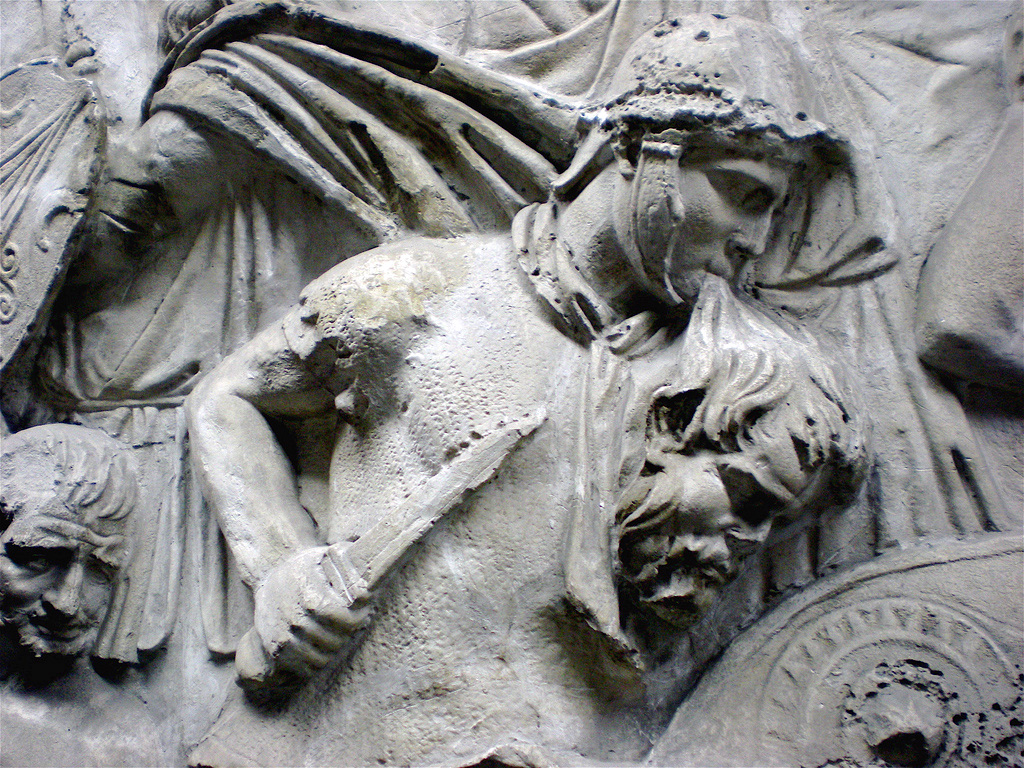
Severed head of a Dacian, Column of the Emperor Trajan (113 CE)
Sale of slaves (chattel slaves as fungible human commodities for sale or trade)
- slavery & terror of Roman conquest, right of war (POWs)
Polybius, Histories 10.15 (the Roman general Scipio Africanus besieges a city in the Second Punic War)
. . . when the walls had been taken in this manner, those who entered through the gate occupied the hill on the east after dislodging its defenders.When Scipio thought that a sufficient number of troops had entered he sent most of them, as is the Roman custom, against the inhabitants of the city with orders to kill all they encountered, sparing none, and not to start pillaging until the signal was given. They do this, I think, to inspire terror, so that when towns are taken by the Romans one may often see not only the corpses of human beings, but dogs cut in half, and the dismembered limbs of other animals, and on this occasion such scenes were very many owing to the numbers of those in the place.
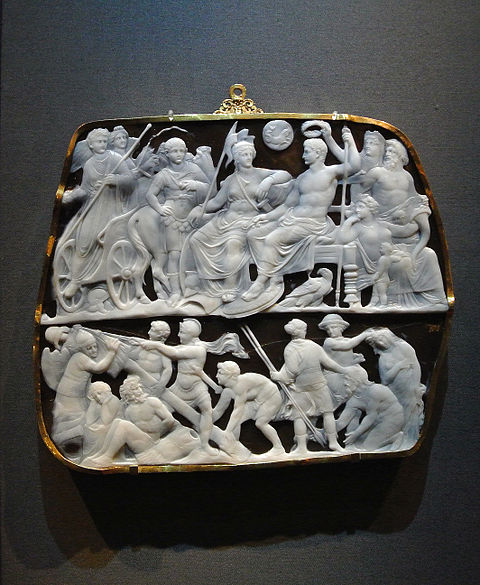
Gemma Augustea depicting defeated enemies in lower register (onyx stone gem cameo-relief, ca. 15 CE)
- Roman idea of enslavement: slaves (servi) have been "saved" (servo, "to preserve"; cf. servio, "to be a slave") as spoils of war/booty > sale sub hasta ("under the spear")
- intrusive model of enslavement: captured outsiders (vs. extrusive exiles), dishonored & deprived of community rights (cf. postliminium = captured Roman citizen's recovered rights); social death (cf. Orlando Patterson, Slavery and Social Death)
- slave's honor subsumed by slaveholder & state (Roman triumph)
- trauma of deracination or natal alienation (no surviving slaves' account) = systematic erasure of memory (personal, social & cultural history, language, place, identity, including names (e.g. "Syrian", "Puer/Boy", "Lucky", "Pretty")
- freedom to slavery a disorientating removal, directionless journey: violence (chains), forced marches, alien environments; loss of freedom, legal rights & physical autonomy = social death (cf. philosopher Giorgio Agamben's biopolitical "bare life" (political prisoners, refugees without citizenship))
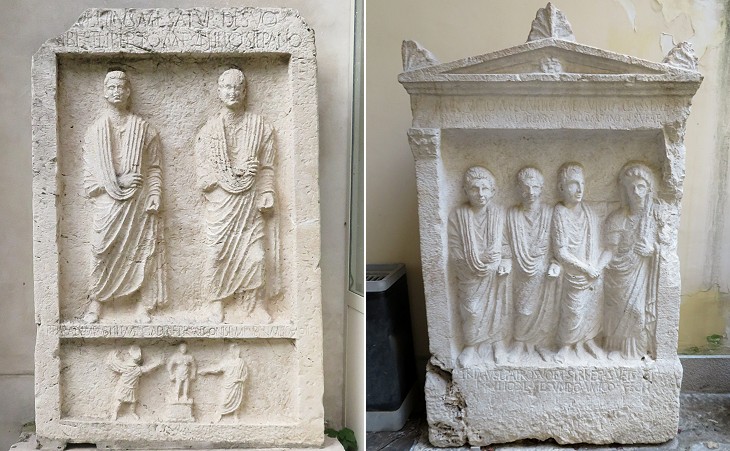
L: Stela of the Publilii (slavedealing freedmen); R: Stela of (freedmen) Marcii, Capua (1st century BCE)
- Roman slave trade: elaborate state enterprise, personnel from capture to final sale, i.e. Roman magistrates (general = imperator, quaestor = financial official, aedile = market overseer); private slave traders & auctioneers (despised occupations); guards; buyers in markets > slaves on platform (catasta)
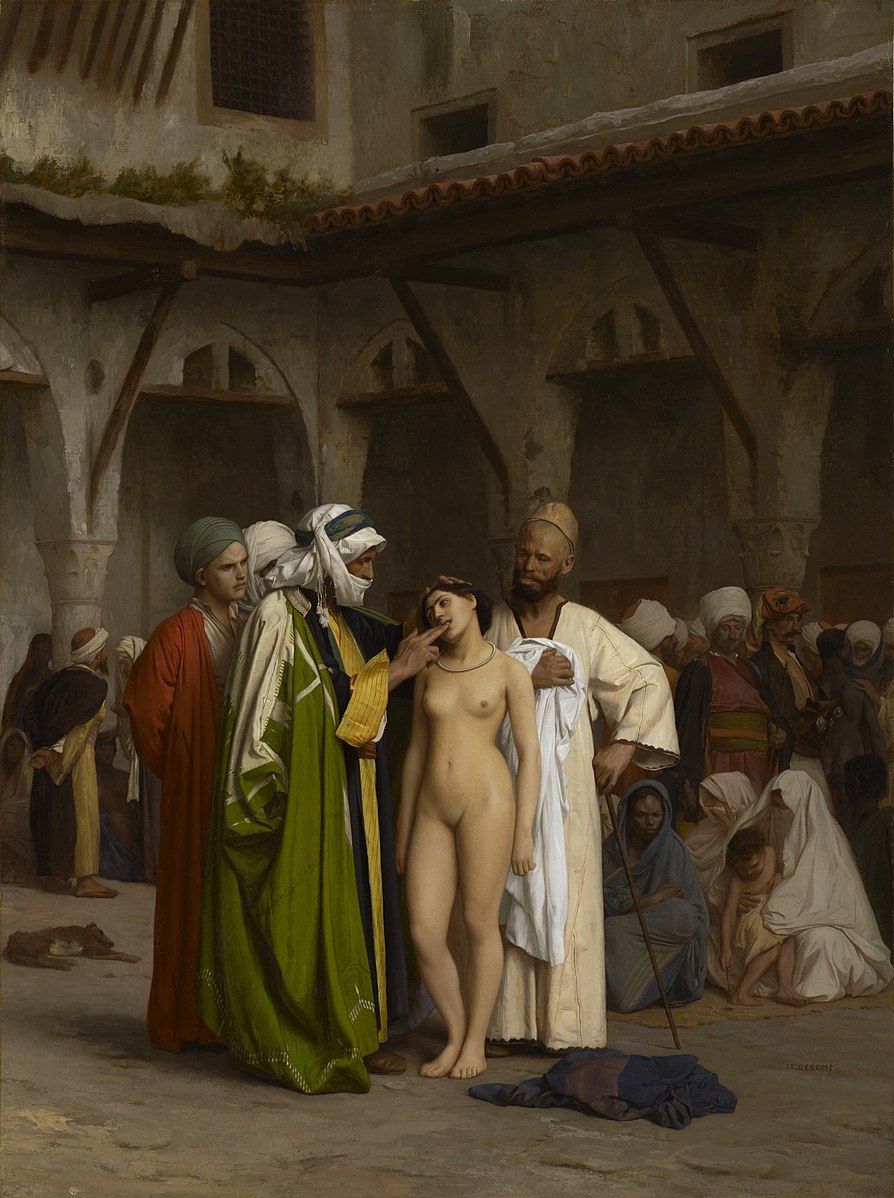
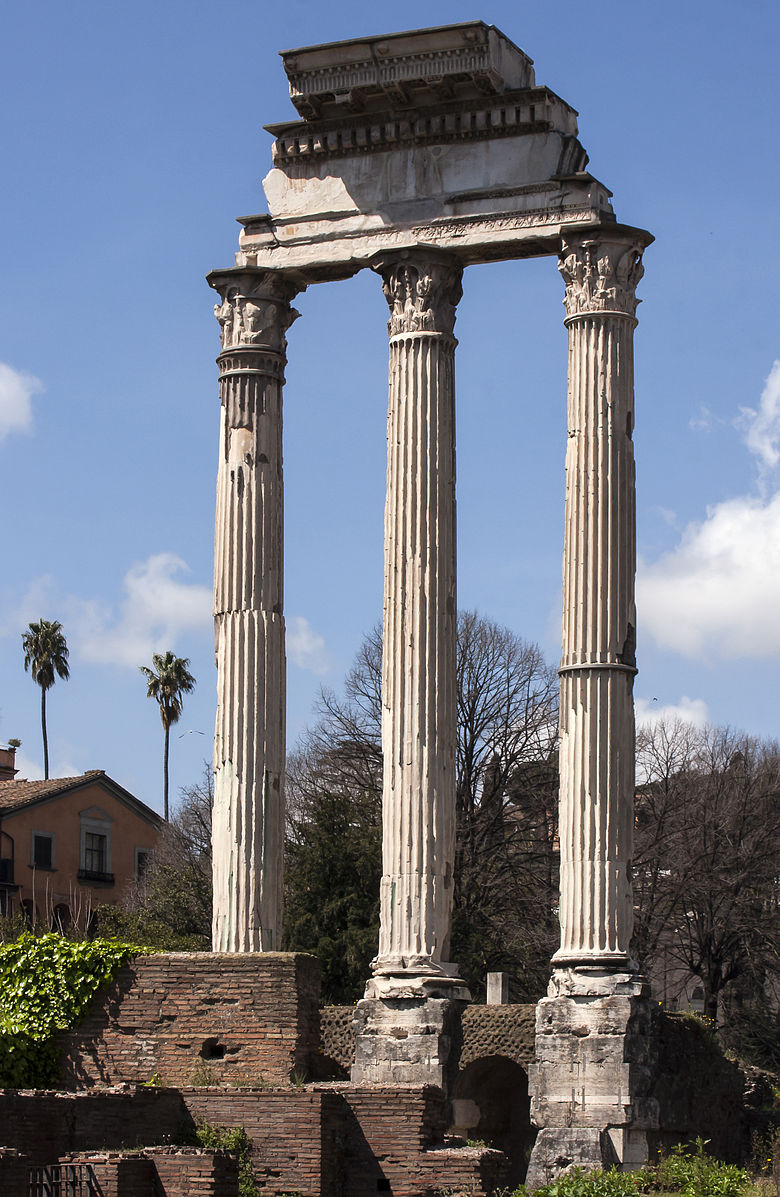
L: Gérôme, A Slave Market in Ancient Rome (1884); R: Temple of Castor & Pollux (Roman Forum)
- normalization & bureaucratization: established trade routes & infrastructure; customs, laws, regulations governing sales (esp. consumer protections against dishonest slave dealers & "defects")
- Edict of the Aediles (codified regulations): inscribed placard around slave's neck, chalked feet, inspections on platform; dealers pitching merchandise (slaves' talents, specialized skills; revelation of defects, behavioral history, physical condition)
Digest XXI 1.1 (an edict on selling slaves)
The aediles say: those who sell slaves are to apprise purchasers of any disease or defect in their wares and whether a given slave is a runaway, a loiterer on errands, or still subject to noxial liability; all these matters they must proclaim in due manner when the slaves are sold. If a slave be sold without compliance to this regulation or contrary to what has been said or promised in respect of him, we will grant to the purchaser and to all other interested parties an action for rescission in respect of the slave.
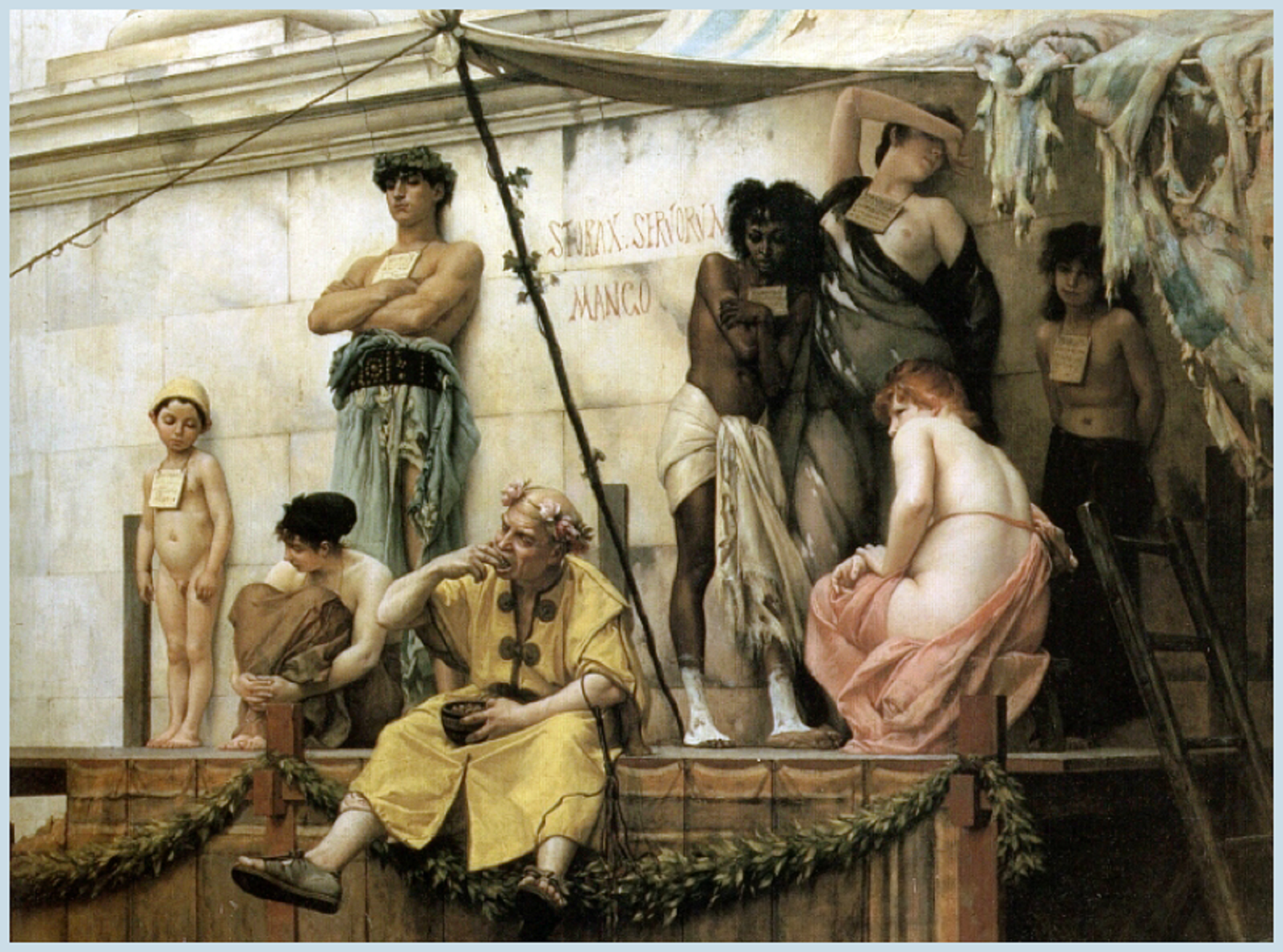
Boulanger, The Slave Market (1866)
- sale: slaveholder's subjective wishes recast deracinated slave in new identity as essentialized other
Martial, Epigrams 9.59 (a pretentious shopper)
Wandering long and often in the Enclosure [in Campus Martius], where golden Rome rummages among her wealth, Mamurra inspected tender boys, devouring them with his eyes; not the ones exposed in the booths in front, but those kept in reserve on the boards of a privy platform, unseen of the public and common folk like me. Sated therewith, he stripped the coverings from round tabletops and called for the oiled ivory exhibited aloft; and after four times measuring a tortoise-shell couch for six, lamented that it was not large enough for his citrus. He enquired of his nostrils whether the bronzes smelt of Corinth, and was critical of Polyclitus’ statues. Complaining that the crystals were vitiated by fragments of glass, he marked and set aside ten pieces of murrine. He weighed antique goblets and any cups ennobled by Mentor’s hand, counted green jewels in ornamented gold, and anything large that tinkles from a snow-white ear. He looked for genuine sardonyxes at every counter and priced big jaspers. As he finally left tired out at the eleventh hour, he bought two wine cups for a copper and carried them off himself
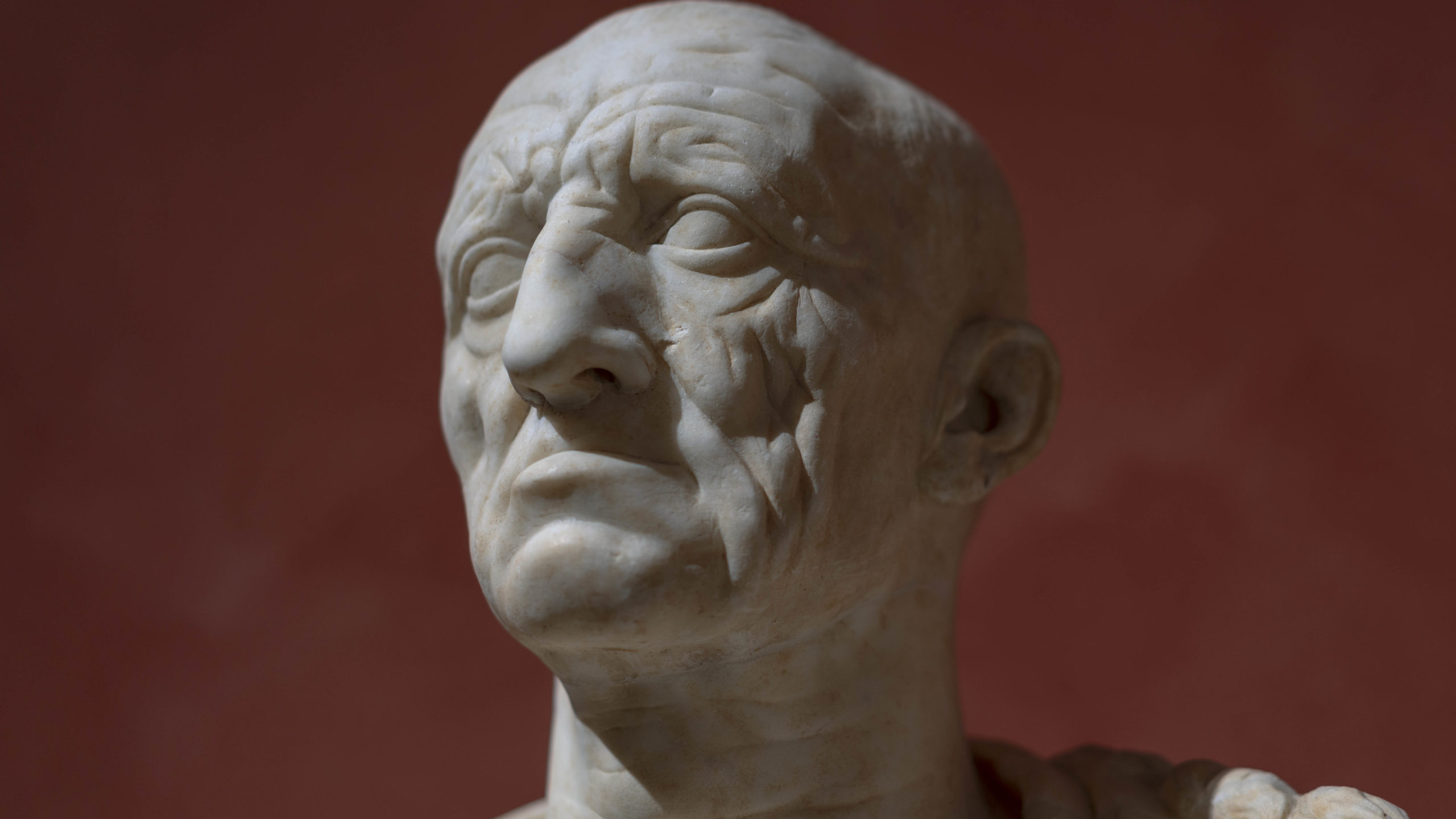
Roman Patrician portrait (1st century BCE)
Marcius Porcius Cato/"Cato the Elder" (234-149 BCE): Consul, Censor; arch-traditionalist
- On Agriculture (ca. 160 BCE): farming instruction manual; transition family farms > Italian estates (latifundia); slave labor in wake of Roman imperialsim
On Agriculture, Introduction (trade & the landed aristocracy)
It is true that to obtain money by trade is sometimes more profitable, were it not so hazardous; and likewise money-lending, if it were as honorable. Our ancestors held this view and embodied it in their laws, which required that the thief be mulcted double and the usurer fourfold; how much less desirable a citizen they considered the usurer than the thief, one may judge from this. And when they would praise a worthy man their praise took this form: "good husbandman, good farmer"; one so praised was thought to have received the greatest commendation. The trader I consider to be an energetic man, and one bent on making money; but, as I said above, it is a dangerous career and one subject to disaster. On the other hand, it is from the farming class that the bravest men and the sturdiest soldiers come, their calling is most highly respected, their livelihood is most assured and is looked on with the least hostility, and those who are engaged in that pursuit are least inclined to be disaffected. And now, to come back to my subject, the above will serve as an introduction to what I have undertaken.
- Cato’s values? ("no gadding about!")
- villa: reflection of elite owner (morality, status, power, character, identity; honor):
On Agriculture 1
See that it be equipped as economically as possible, and the land be not extravagant. Remember that a
farm is like a man—however great the income, if there is extravagance but little is left.
On Agriculture 3
It is well for the master to have a well-built barn and storage room and plenty of vats for oil and wine, so that he may hold his products for good prices; it will redound to his wealth, his self-respect, and his reputation.

Winemaking mosaic from the Church of Santa Constanza (4th century CE)
- human capital: slaves' care to ensure productivity & longevity ("[The overseer] must see that the servants are well provided for, and that they do not suffer from cold or hunger", On Agriculture 5); inventory of equipment for small vineyard (16 persons, 3 pruning hooks, 5 axes, 6 spades, 1 wash tub, 1 bath tub, 4 beds & mattresses, 1 chamber-pot, etc., On Agriculture 11)
Slave quarters at Civita Giuliana near Pompeii
On Agriculture 2 (chastising the overseer/vilicus for inefficiencies)
If it has been a rainy season, remind him of the work that could have been done on rainy days: scrubbing, hauling out manure, making a manure pit, cleaning seed, mending old harness and making new; and that the hands ought to have mended their smocks and hoods. Remind him, also, that on feast days old ditches might have been cleared, road work done, brambles cut, the garden spaded, a meadow cleared, firewood bundled, thorns rooted out, spelt ground, and general cleaning done. When the slaves were sick, such large rations should not have been issued.
On Agriculture 5 (controlling & managing slaves to maximize efficiency & production)
Let him keep them busy with the work—he will more easily keep them from wrongdoing and meddling. If the overseer sets his face against wrongdoing, they will not do it; if he allows it, the master must not let him go unpunished . . . [The overseer] must see to it that he knows how to perform all the operations of the farm, and actually does perform them often, but not to the point of becoming exhausted; by doing so he will learn what is in his servants' minds, and they will perform their work more contentedly.
On Agriculture 54-9 (allotment of provisions)
There is nothing more profitable than to take good care of cattle . . . Rations for the hands [grain/bread, wine, olive paste, salt, vinegar] . . . Clothing allowance for the hands: A tunic 3½ feet long and a blanket every other year. When you issue the tunic or the blanket, first take up the old one and have patchwork made of it. A stout pair of wooden shoes should be issued every other year.
- ergastulum ("prison") for "chain-gang"










